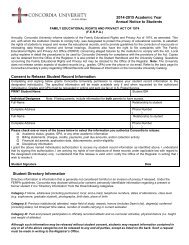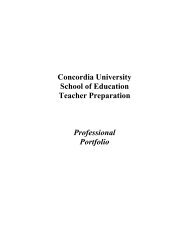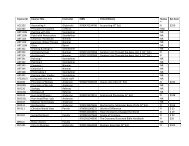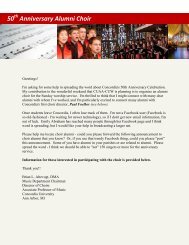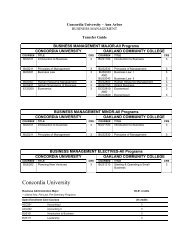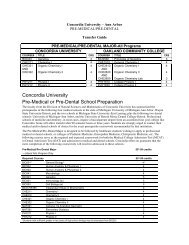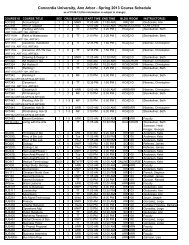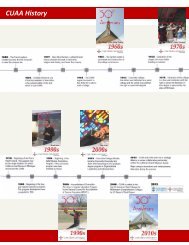2009â2010 Academic Catalog - Concordia University Ann Arbor
2009â2010 Academic Catalog - Concordia University Ann Arbor
2009â2010 Academic Catalog - Concordia University Ann Arbor
Create successful ePaper yourself
Turn your PDF publications into a flip-book with our unique Google optimized e-Paper software.
<strong>Concordia</strong> <strong>University</strong> <strong>Ann</strong> <strong>Arbor</strong> 2009–2010 <strong>Academic</strong> <strong>Catalog</strong><br />
CONCORDIA UNIVERSITY ANN ARBOR<br />
<strong>Concordia</strong> <strong>University</strong> is a Christian educational institution where the Lutheran understanding of Scripture and<br />
the Good News of Jesus Christ permeates the culture and is shared with everyone. Our primary enterprises are<br />
learning, teaching, and scholarship grounded in faith. We are a community that expresses concern and care for<br />
every individual.<br />
Located in the heart of Southeast Michigan, <strong>Concordia</strong> <strong>University</strong> offers an intimate, stimulating campus<br />
environment in the midst of a cosmopolitan university community with an international flair. <strong>Concordia</strong><br />
students enjoy a challenging academic environment dedicated to the intellectual, social, and spiritual growth of<br />
each individual in a supportive Christian community.<br />
Our History<br />
<strong>Concordia</strong> <strong>University</strong> stands on 187 acres overlooking the Huron River. Once a home to peoples of the<br />
Chippewa, Ottawa, Potawatomi, Huron and Miami nations, the campus is bisected by Geddes Road, formerly<br />
the Potawatomi Trail, an old Indian highway. In the spring of 1680, the French explorer LaSalle became the<br />
first European to view the campus site. The earliest settler of the land was Elnathan Botsford, one of the first<br />
residents of <strong>Ann</strong> <strong>Arbor</strong>, who arrived in 1825. In 1917, Harry Boyd Earhart purchased the property. A<br />
philanthropist, Mr. Earhart’s interests focused on education, religion and charity. In the late 1950s, the Lutheran<br />
Church-Missouri Synod began a search for a site to build a college. The Earhart estate was purchased in the<br />
early 1960s and construction commenced. <strong>Concordia</strong> College, <strong>Ann</strong> <strong>Arbor</strong> was dedicated in 1963 as a junior<br />
college. That year, <strong>Concordia</strong> was granted the right to award the Associate of Arts degree by the State of<br />
Michigan. The expansion of the college to a four-year institution with the right to award the Bachelor of Arts<br />
degree was approved by the State in 1976. In 2000, the State approved the graduate program and awarding a<br />
Master of Science degree. In July 2001 the name was officially changed to <strong>Concordia</strong> <strong>University</strong>.<br />
The <strong>University</strong> offers a variety of pre-professional programs, in addition to degree programs. These programs<br />
prepare students to enter professional schools or are for those who desire a two year course of study.<br />
Our Mission and Vision<br />
Mission<br />
Within its distinctly Christian environment and its academic community dedicated to excellence, <strong>Concordia</strong><br />
<strong>University</strong> serves as a liberal arts <strong>University</strong> of The Lutheran Church-Missouri Synod, preparing men and<br />
women for a life of service in the church and in the world.<br />
Vision<br />
<strong>Concordia</strong> <strong>University</strong> will enable learners to succeed in a rapidly changing world. <strong>Concordia</strong> will be:<br />
• committed to faith and values formation<br />
• focused on learner-centered achievement<br />
• populated with diverse scholars<br />
• engaged locally and globally<br />
Accreditations and Affiliations<br />
<strong>Concordia</strong> <strong>University</strong> is a member of The North Central Association of Colleges and Schools. North Central<br />
granted initial accreditation of <strong>Concordia</strong>’s program in 1968. The North Central Association most recently<br />
reviewed the expanded academic program in 2001. Accreditation of the four-year program has been in effect<br />
since July 1976 and the graduate program since 1999. In addition, <strong>Concordia</strong> <strong>University</strong> is accredited by the<br />
National Council for the Accreditation of Teacher Education (NCATE). Documents are on file in the Office of<br />
the Vice President, <strong>Academic</strong>s and may be reviewed by appointment.<br />
<strong>Concordia</strong> holds membership in: the Lutheran Educational Conference of North America; the Association of<br />
Independent Colleges and Universities of Michigan; the National Association of Independent Colleges and<br />
Universities; the American Council on Education; the American Association of Collegiate Registrars and<br />
Admissions Officers; the Michigan Association of Collegiate Registrars and Admissions Officers; the<br />
American Association of Higher Education; the Michigan Association for Colleges of Teacher Education; the<br />
National Research Center for College and <strong>University</strong> Admissions; the National Association of Christian<br />
College Admissions Personnel; the Lutheran Admission Counselors of the Missouri Synod; the Association of<br />
Lutheran College Faculties; the National Christian College Athletic Association; and the National Association<br />
of Intercollegiate Athletics.<br />
Pg. 6 of 118



